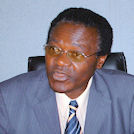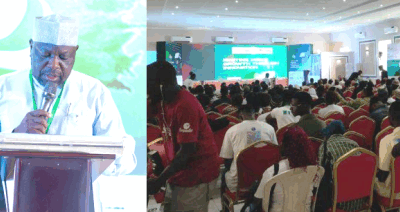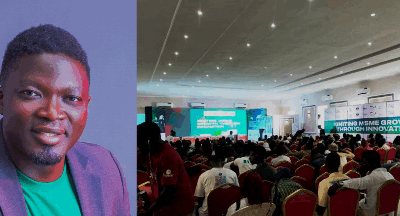Professor Cleopas Officer Angaye is the DG/CEO of the National Information Technology Development Agency (NITDA). A professor of Computer Science, Angaye speaks of the challenges of creating the required momentum to achieve NITDA’s mandate in the area of Internet diffusion, software development and human capacity building as the agency established in 2001 turns 10 this year.
Internet diffusion has remained a challenge in Nigeria, what is NITDA doing to spread access particularly in rural areas which constitute the greater number of undeserved areas?
Part of NITDA’s mandate is to provide more Internet penetration not only in urban centres but also in rural and undeserved areas. Back In 2007, what I believe we should be doing is to ensure that the neglected areas are properly served. Many of the lofty projects designed to increase Internet access as well as encourage software development and e-learning are being put in areas you will regard as undeserved. The idea is fostered on what we called Rural Information Technology Centres similar to Mobile Internet Units which was there. The Mobile Internet Unit programme is good but the cost of bandwidth is a discouraging factor, you pay about N450, 000 for bandwidth for three weeks. Because it is not permanent after the transit training, it cannot achieve the kind of objective that something permanent will achieve so we came up with the Mobile Internet Information Centre. We have over 1,400 across the country. The idea is to ensure that people who live in rural areas have a feeling of how they can use the knowledge-based economy to process certain things. We have many challenges even with this. We have challenges of infrastructures; power and even getting the rural people to accept the project. You can give something to somebody and the person may not accept it in a way that could optimize the benefits or purpose for which the thing was giving in the first place. Besides, we do not expect to fund the project forever. We expect the local government councils to take over the funding and sustainability of the project in their locality. That has not happened. Apart from the infrastructure challenge, we have issues with awareness, human capacity building; we still have to a lot in the area of training to do that could absolve a lot of unemployed youths into the IT industry. But government cannot do it alone. Government needs the private sector as partner to carry out extensive capacity training for thousands of Nigerian youths. We did a skill acquisition training in 2006 involving about 200 people in Lagos, 200 in Port Harcourt, and 200 in Abuja. Last year, we trained over 6000 unemployed graduates and 950 university lecturers. All these are designed to close the information gap and provide a new career path for the unemployed. But these efforts are not enough. Government needs partners from the private sector to provide these different levels of capacity building.
What is NITDA doing to encourage the private sector and other stakeholders to drive e-Readiness?
NITDA has been collaborating with other stakeholders to encourage growth at different aspects of the IT industry. Last year, for instance, we worked with Internet exchange providers to fund two exchange points. The one in Abuja is ready and will be commissioned soon. We have collaborated with CPN [Computer Professional Registration Council of Nigeria] to provide curriculum development to address one of the major problems facing our schools. NITDA is actively working with the CPN to ensure that what is taught in our schools is up to date and meet the industry standard in a way that would make our youths employable and dependable when they leave the school environment. This is an area of capacity building that demands urgent attention and we are glad to be on this with the CPN. We are collaborating in the area of workshop, seminar and engaging other institutions to empower the citizens in IT. Our engagements actually cut across sectors. In terms of capacity building, we already have a scholarship scheme designed to empower the citizens with advance skill in IT. The scholarship scheme covers undergraduate to post graduate studies in the field of IT. We have scholarships for first degrees, master degrees and up to Ph.D.
The telecom sector and several others are virtually driven by software. It is within your mandate to encourage the growth of the local software industry. What is NITDA doing in this direction?
You know about the OEM policy of the government under which local computer hardware manufacturers are supported. We haven’t got a similar policy for the software industry right now. So back in January we commissioned a committee to come up with a policy on software development. In fact, the committee is going to have a draft policy ready very soon that will set the pace for software acquisition and software importation. We should check what is coming into the country to protect our economy. We are setting the pace for adequate software testing in order to maintain an acceptable standard. We have our own people producing software but they are actually not patronized; even our own people will not patronized software products by our own indigenous developers because the perception is that they are not good enough which is faulty as it is. Therefore, we are setting up software testing centres where our software can be well tested based on international standard. The NEED analysis for this is already done. We are hoping to boost the economy in two ways. First, it will create standard and encourage acceptance in the industry for the products of our software practitioners. This will help to boost growth in the industry and create job avenue for thousands of our youths in software analysis and software design, Secondly, it will give opportunity to entrepreneurs to invest more heavily in the industry since there is assurance of returns. The labour market is the ultimate winner in terms of job creation.
NITDA is 10 years this year. What are parts of its achievements?
We have made a lot of impact across sectors in both the public and private sectors. We have done a lot of awareness and capacity building; and there are a lot of areas that difficult to quantify in terms of naira value. We have trained permanent secretaries, directors, jobless graduates, and we have trained lecturers and so on. In terms of trying to achieve its goals, there have been challenges. Let’s look at the legal framework. When NITDA was created in 2001, there was no law backing it up. In April 2007, an Act was established which has made it possible to give a legal footing to what NITDA is doing in the area of Information Technology. We have evolved scholarship schemes to encourage capacity building at all levels; facilitated Internet mobile units to bring access and awareness about the knowledge economy to our rural citizens; we are doing research in several IT related areas to improve our experience and usage of IT including research in electronic voting system, authentication of our websites particularly of ministries and other government agencies. We are at the forefront of promoting a bill to regulate cyberspace related activities including cybercrime in partnership with other institutions including the Central Bank.






























